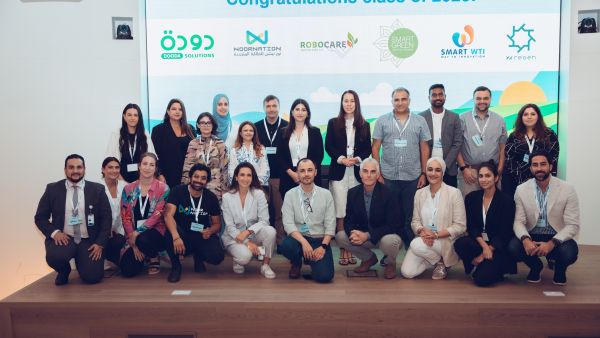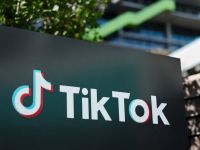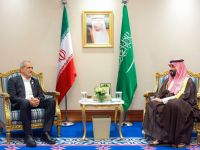Two Jordan start-ups selected for PepsiCo’s 2023 Greenhouse Accelerator Program: MENA Sustainability Edition

Today, PepsiCo announced that SmartWTI and Smart Green, start-ups from Jordan, have been chosen to participate in the second cohort of its Greenhouse Accelerator Program: MENA Sustainability Edition, focused on sustainable agriculture. Following a rigorous multi-stage selection process, this year’s cohort brought forward innovative ideas across five key criteria: alignment to PepsiCo’s sustainability strategy – PepsiCo Positive (pep+) – strategic synergy with PepsiCo, scalability, relevance to MENA, and breakthrough potential.
Sustainable agriculture takes on special meaning in Jordan, which has no oil resources and a scarce water supply. This raises concerns around food security and creates uncertainty in a region that thrives on long-term planning and predictability. PepsiCo’s Greenhouse Accelerator Program intends to unlock innovative and disruptive agricultural solutions in partnership with purpose-driven start-ups from the region that share PepsiCo’s vision for a more sustainable agriculture and water management system.
The six shortlisted companies, SmartWTI, Smart Green, Dooda Solutions, NoorNation, RoboCare and YY ReGen, were selected from over 180 applications across 18 countries. Each of the companies brings a unique level of expertise and innovative solution to the table from all aspects of the agriculture value chain from water preservation to soil cultivation.
SmartWTI, an IoT/AI solutions provider from Jordan, specializes in designing and manufacturing water management solutions to enable the Internet of Things (IoT). Smart Green, another Jordanian start-up, provides Agri-tech solutions to agribusinesses for Digital Transformation from traditional agriculture to modern agriculture. These startups have the potential to disrupt the sustainable agriculture industry and make a positive, lasting impact on society.
Each will receive an initial grant of $20,000 to support their business and help scale up their innovation, along with guided mentorship from regional subject matter professionals, as well as PepsiCo and Food Tech Valley experts. At the end of the six-month program, one winning company will be awarded an additional $100,000 in funding to continue its expansion and have an opportunity to extend its collaboration with PepsiCo to further expedite its growth.
Aamer Sheikh, CEO, Middle East – PepsiCo said, “We are delighted to continue our search for pioneering solutions that help us strengthen the resilience of our food system. This year, we have embarked on a search for transformative direct farming innovations that increase agricultural productivity while conserving our precious natural resources for the next generations. I was impressed with the caliber of the participants in the second cohort, and I am confident that together, we can blaze new trails in sustainable agriculture.”
Introduced regionally in 2021, last year’s inaugural program of the PepsiCo Greenhouse Accelerator Program: MENA Sustainability Edition, focused on sustainable packaging and recycling. Two start-ups from Jordan were selected among the 10 shortlisted companies. MEHNA, which aims to find and implement sustainable solutions for the industrial sector and eRecycle Hub which proposes to digitize the scrap-trading business.
Amina Mari, CEO, Jordan – MEHNA commented, “Our journey with the first edition of PepsiCo’s Accelerator Program was transformative, equipping us with the essential technical, commercial, financial, and legal skills to propel our start-up forward. With their invaluable guidance and mentorship, we have honed our project development process, identified promising markets and partnerships, and pushed the boundaries of innovation to create sustainable and disruptive solutions. We extend our warmest wishes and support to the next cohort of talented entrepreneurs who are setting out to shape a brighter future.”
Recently, the Kingdom of Jordan launched a new water strategy for the years 2023-2040, outlining the government's goals and plans to achieve water security. PepsiCo is committed to an accelerated, sustainable growth agenda in Jordan. It has placed focus on achieving water-use efficiency in operations by implementing best-in-class water-use standards across facilities. Through Jordan Ice & Aerated Water, PepsiCo’s bottling partner in Jordan, the company has invested in watershed health to improve overall ecosystem health and biodiversity, installing six water dams (sand and concrete) and one rainwater collection pond to ensure the watershed is replenished.
For more information on the initiative and the six shortlisted startups, please visit the Greenhouse Accelerator program website or the PepsiCo Positive (pep+) Middle East LinkedIn page.
Background Information
Pepsi Cola International
In 1965, Donald Kendall, the CEO of Pepsi-Cola, and Herman Lay, the CEO of Frito-Lay, recognized what they called “a marriage made in heaven,” a single company delivering perfectly-salty snacks served alongside the best cola on earth. Their vision led to what quickly became one of the world's leading food and beverage companies: PepsiCo.
For more than 50 years, as tastes, trends and lifestyles have changed, PepsiCo has evolved with them. Our willingness to adapt and grow has transformed our snack and soda company into a collection of global brands including Pepsi and Quaker, Gatorade and Tropicana, Frito-Lay and beyond. Today, PepsiCo is one of the world’s most-respected companies with products sold in more than 200 countries and territories and 22 brands that generate more than $1 billion each in estimated annual retail sales.






